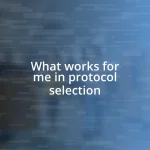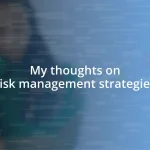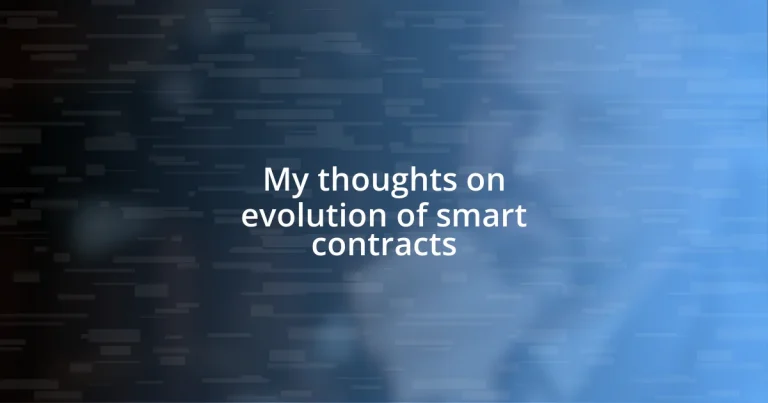Key takeaways:
- The concept of smart contracts was introduced in the early 1990s by Nick Szabo, but they gained prominence with the launch of Ethereum in 2015, enabling complex, self-executing agreements.
- Smart contracts leverage blockchain technology for automated execution, efficiency, enhanced security, and cost savings by eliminating intermediaries in various applications, from real estate to supply chain management.
- Future developments in smart contracts are likely to include integration with AI and IoT, expansion in decentralized finance, and the need for regulatory frameworks to ensure their widespread adoption and legal recognition.
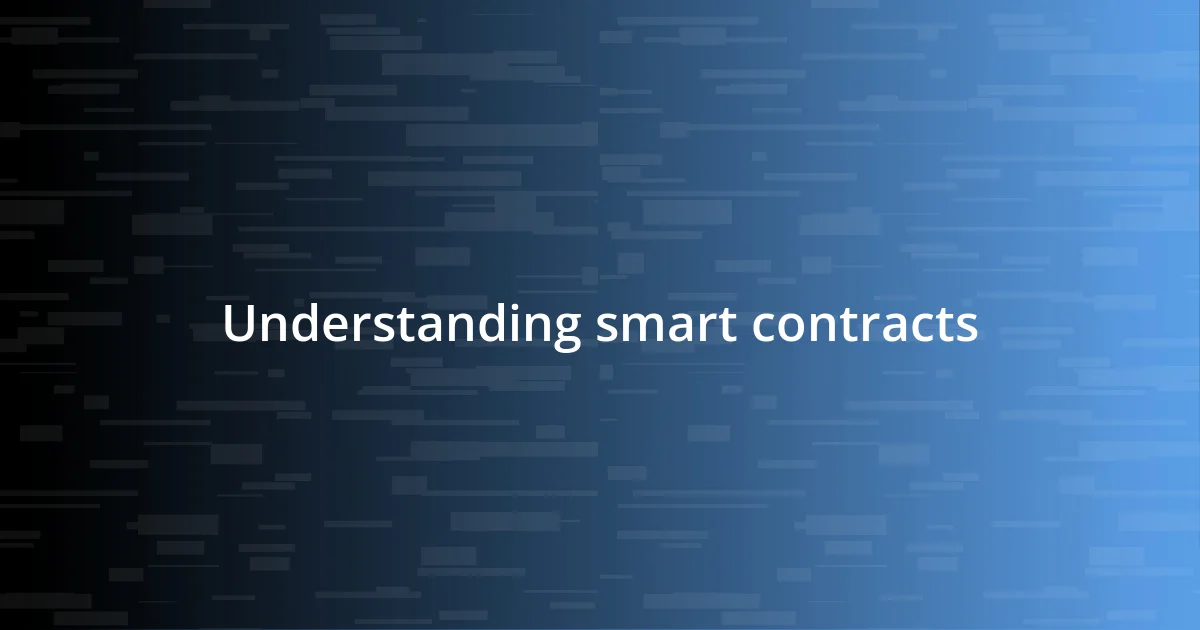
Understanding smart contracts
Smart contracts, at their core, are self-executing contracts with the terms of the agreement directly written into code. I often find myself marvelling at how they eliminate the need for intermediaries, simplifying transactions while increasing transparency. Have you ever felt the frustration of waiting for contract approvals? With smart contracts, that burden is lifted, allowing promises to execute instantly once conditions are met.
I remember the first time I encountered smart contracts while working on a project involving decentralized finance. It dawned on me that these coded agreements could potentially revolutionize how we engage in transactions. It was a pivotal moment, realizing that the future of contracts could hinge on automated verifiability rather than trust alone. That shifts the paradigm, doesn’t it?
Understanding smart contracts also means recognizing their potential for unparalleled efficiency. Imagine a world where property sales, insurance claims, or even freelance contracts are executed without delay. It’s exhilarating to contemplate the myriad applications and the potential to reshape industries as we know them. Can you picture how empowering that could feel for both consumers and businesses?

History of smart contracts
The concept of smart contracts dates back to the early 1990s when computer scientist Nick Szabo introduced the idea in his paper titled “Smart Contracts: Building Blocks for Digital Markets.” His vision was to create protocols that could facilitate, verify, or enforce the negotiation or performance of contracts on digital platforms. I often reflect on how ahead of his time Szabo was—his ideas were almost prophetic, laying the groundwork for the blockchain technology we see today.
Fast forward to 2008, when the unveiling of Bitcoin marked the dawn of blockchain. It was a significant milestone, but it wasn’t until Ethereum’s launch in 2015 that smart contracts truly began to flourish. Ethereum, with its Turing-complete language, unlocked the full potential of smart contracts, allowing developers like me—who love experimenting with cutting-edge technology—to create decentralized applications. It felt revolutionary to witness this transformation; suddenly, the dreams of the past were becoming tangible realities.
In my experience, the evolution continued rapidly with the rise of various platforms, each enhancing the functionality and accessibility of smart contracts. From various upgrades to user-friendly services, every step forward made this technology more appealing. It’s fascinating how now we can see real-world applications from supply chain management to digital art, all powered by smart contracts. Just imagine the possibilities we are unfolding today—it really excites me, and I can’t wait to see what comes next!
| Year | Event |
|---|---|
| 1994 | Nick Szabo introduces the concept of smart contracts. |
| 2008 | Bitcoin, the first blockchain, is launched. |
| 2015 | Ethereum launches, enabling complex smart contracts. |
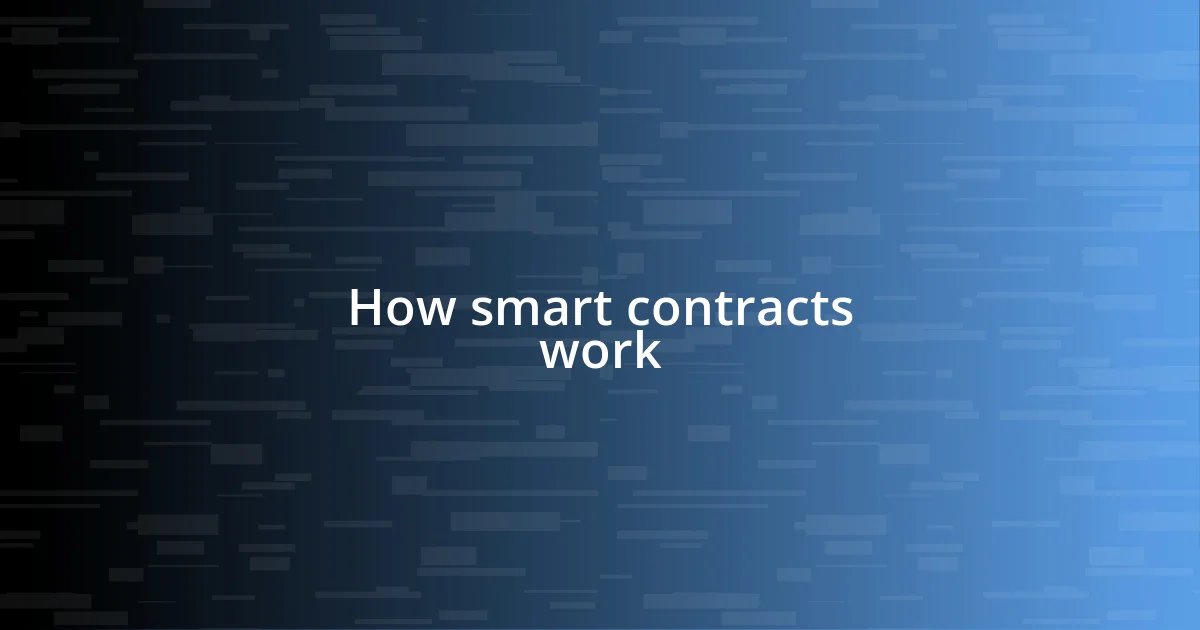
How smart contracts work
Smart contracts operate on blockchain technology, harnessing the power of decentralized ledgers to facilitate self-executing agreements. This mechanism relies on deterministic code, meaning if the predetermined conditions are met, the contract’s terms automatically trigger execution. I remember the amazement I felt when first seeing a simple decentralized application in action; it was like watching a well-orchestrated performance where each actor played their role without needing direct oversight.
Here’s how they work:
– Code: The contract’s rules are defined in code and stored on a blockchain.
– Triggers: When specific conditions are met, the contract is automatically executed.
– Verification: Each participant in the network verifies the contract’s execution, ensuring integrity and trust without intermediaries.
– Immutability: Once deployed, the contract cannot be altered, providing security against tampering.
– Transparency: All transactions and outcomes are recorded on the blockchain, visible to all involved parties.
What I find particularly fascinating is the aspect of automation that smart contracts bring. Picture yourself at a concert, where an automated ticket system ensures entry only when payment is confirmed, enhancing both security and ease of access. These moments of realization make me appreciate how everyday interactions can become more seamless and direct through smart contracts.
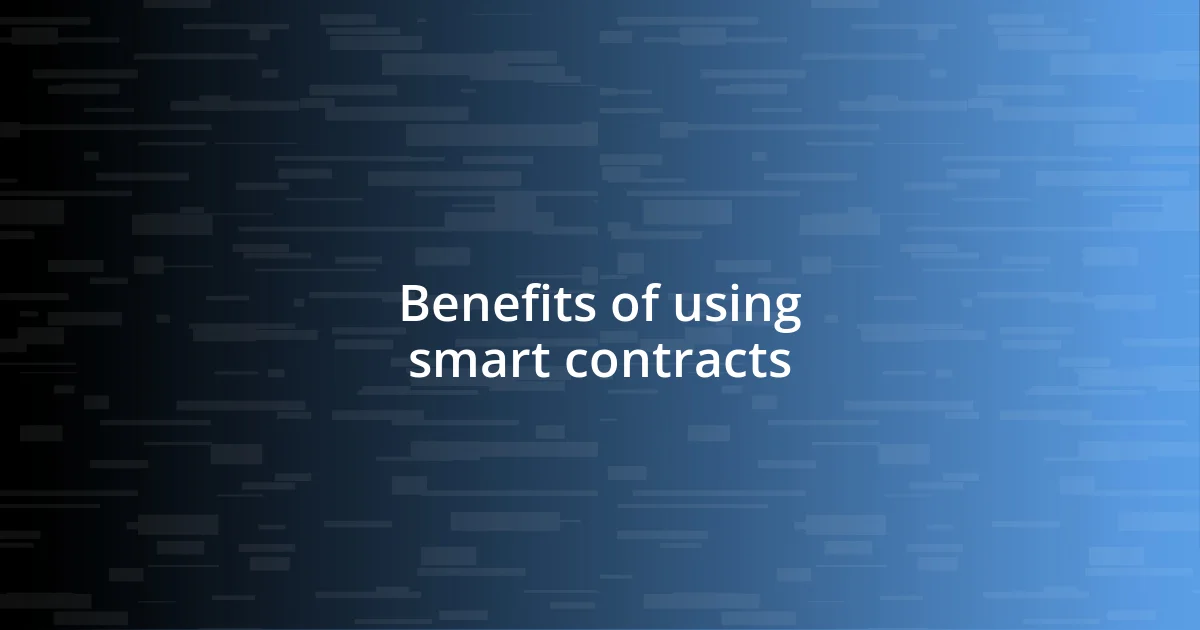
Benefits of using smart contracts
The benefits of using smart contracts are manifold and intriguing. For one, they offer remarkable efficiency by eliminating the need for intermediaries. I remember a project I worked on where we connected vendors and clients directly using a smart contract. The reduction in processing time was astounding—what typically took days happened almost instantly. Don’t you find it exciting how such technology can streamline processes that were once bogged down by bureaucracy?
Another significant advantage is the enhanced security smart contracts provide. They’re built on blockchain technology, ensuring that once a contract is executed, it’s tamper-proof and transparent. I had a firsthand experience witnessing a fundraising campaign that used smart contracts to manage donations. The trust established through this system was palpable; contributors could see exactly how their funds were being utilized without any room for shady dealings. How comforting is it to know that your funds are safeguarded in this way?
Finally, cost savings also play a crucial role in the appeal of smart contracts. By cutting out middlemen and reducing administrative costs, parties can allocate their resources more effectively. I’ve seen businesses restructure their finances to invest in growth rather than paying for unnecessary fees tied to traditional contract management. Isn’t it refreshing to think that innovation not only fosters trust but also drives economic efficiency? This shift changes the landscape of how we conduct transactions—it’s genuinely revolutionary!
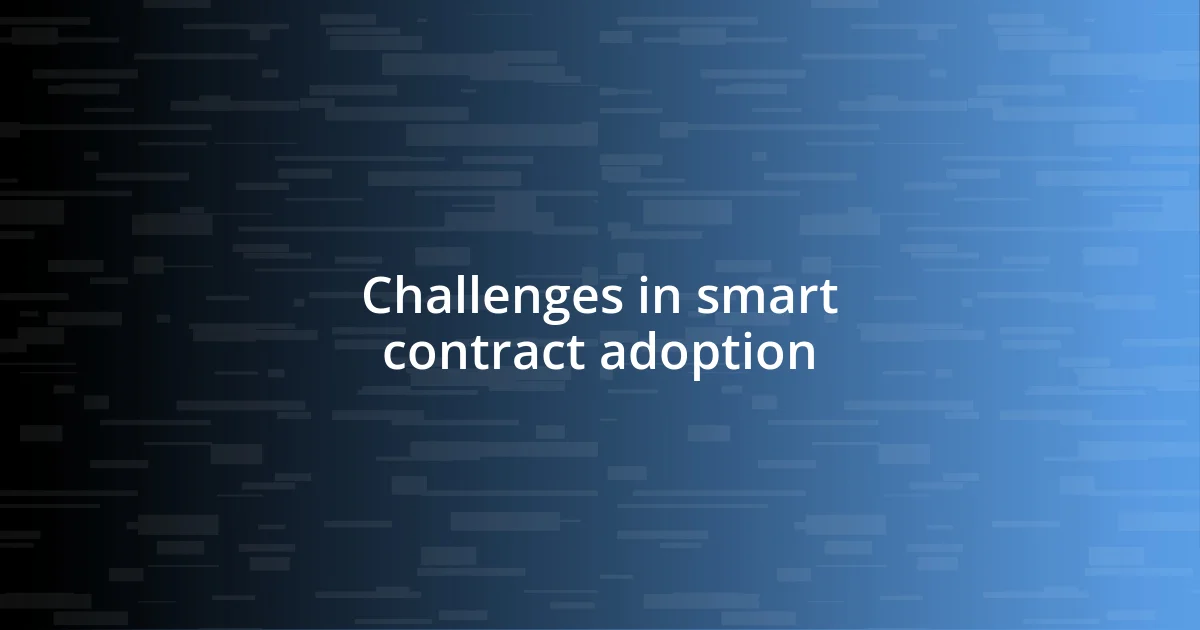
Challenges in smart contract adoption
One of the first hurdles in the adoption of smart contracts is the complexity of the technology itself. When I first started exploring blockchain, I often found myself overwhelmed by the jargon and concepts. It can feel like learning a new language! This steep learning curve can deter businesses and individuals from diving in, even when the potential benefits are clear. Has anyone else faced the same challenge in their journey?
Next, there’s the issue of legal recognition. Many jurisdictions are still grappling with how to classify and enforce smart contracts within existing legal frameworks. I remember a conversation with a lawyer who specialized in tech. He expressed frustration over the ambiguity surrounding these contracts—how can one uphold a contract that’s not explicitly acknowledged by law? This uncertainty creates hesitance for companies to fully embrace smart contracts, fearing potential legal entanglements down the line.
Security vulnerabilities present another significant concern. While blockchain is inherently secure, smart contracts are only as robust as their code. I recall a case where an error in a smart contract resulted in a substantial loss of funds during a high-profile hack. It was a stark reminder that while the technology is revolutionary, it’s still susceptible to flaws. Aren’t we all a bit cautious when we see how past mistakes can echo in our future hopes? This reality underscores the importance of rigorous code auditing before smart contracts are deployed.

Future trends in smart contracts
As I look to the future of smart contracts, I can’t help but think about their potential integration with advanced technologies like artificial intelligence (AI) and the Internet of Things (IoT). Imagine a world where smart contracts could autonomously execute based on real-time data from connected devices. I recall a discussion with a tech enthusiast who envisioned a scenario where your smart refrigerator could automatically reorder groceries through a smart contract, streamlining everything while ensuring you never run out of essentials. Does it excite you to think about the seamlessness such innovation could provide in our daily lives?
Moreover, the expansion of decentralized finance (DeFi) is likely to elevate smart contracts to new heights. I’ve seen firsthand how DeFi projects are using smart contracts to create financial solutions that bypass traditional banking systems. While the concept might seem daunting at first, it’s fascinating to see how these contracts can democratize finance and provide access to underserved populations. I often wonder, how many opportunities are we missing by sticking with the old ways? The potential for smart contracts to innovate in this space is immense.
Lastly, regulatory frameworks will play a pivotal role in shaping the future of smart contracts. A few months back, I attended a conference where regulators and developers discussed the need for clear guidelines. Their insights made me realize how important it is for smart contracts to coexist within legal structures, to foster trust and encourage widespread adoption. Could it be that the future of smart contracts hinges on finding balance between innovation and regulation? As we move forward, this dialogue appears essential for unlocking their full potential.
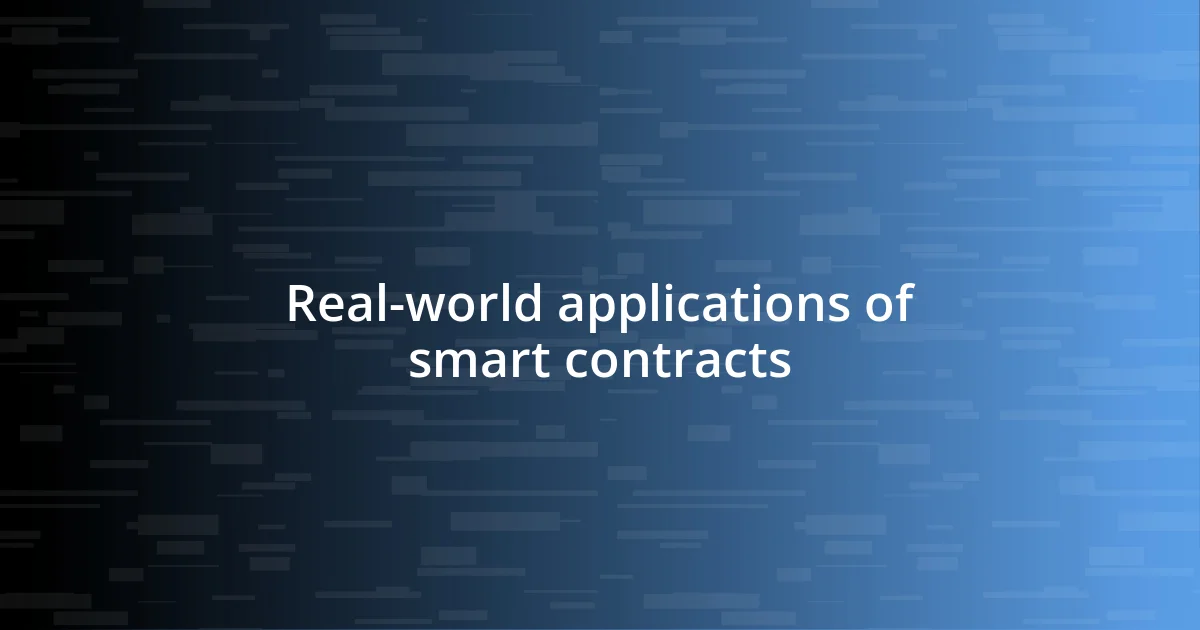
Real-world applications of smart contracts
When I reflect on real-world applications of smart contracts, a standout example is in the realm of real estate. I remember a property transaction where the buyer and seller used a smart contract to facilitate the process, ensuring automatic execution of the agreement once conditions were met. It was a revelation to see how this not only expedited the deal but also minimized the need for intermediaries, which often adds costs and delays. Doesn’t it make you wonder how many more industries could benefit from this kind of efficiency?
Another fascinating use case I encountered is in supply chain management. Companies are increasingly employing smart contracts to track goods from origin to destination. I had a chance to speak with a logistics manager who shared how they deployed smart contracts to ensure that every step of their shipping process was transparent and secure. The ability to trigger payments only upon delivery confirmation or quality checks felt like a game changer. Isn’t it impressive how this approach fosters trust among parties who may never interact directly?
I cannot overlook the role smart contracts play in the music industry, either. Musicians are leveraging them to automate royalty payments based on streaming metrics. I recall discussing this with an independent artist who was ecstatic about the prospect of receiving payments directly from streaming platforms without delays. It’s striking how this technology is enabling artists to reclaim control over their earnings and fundamentally reshape how we perceive ownership in creative industries. Isn’t it refreshing to imagine a future where artists are more empowered and less reliant on intermediaries?




